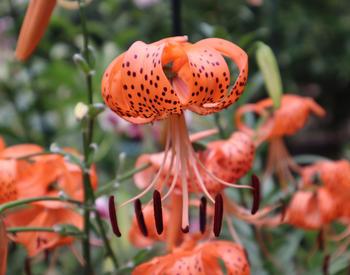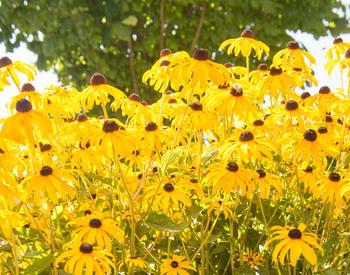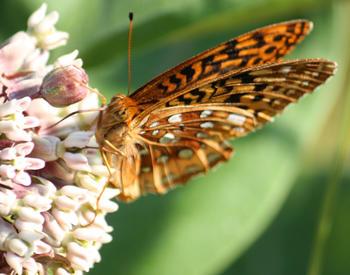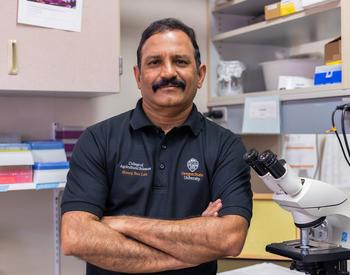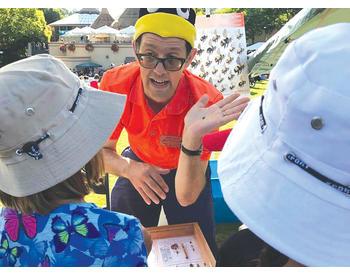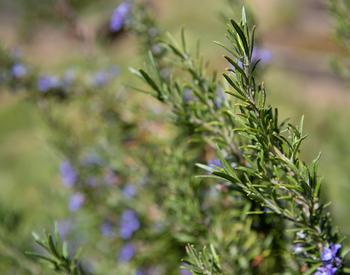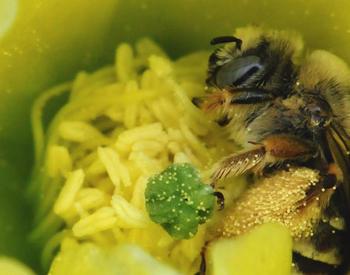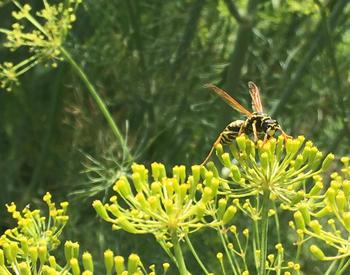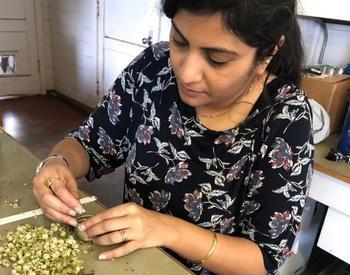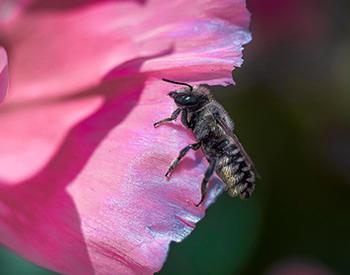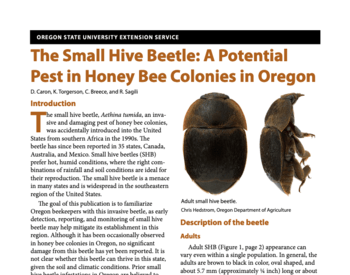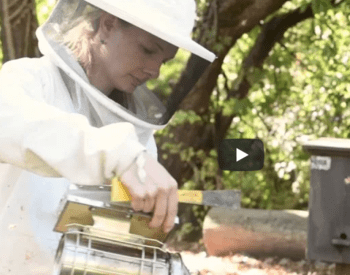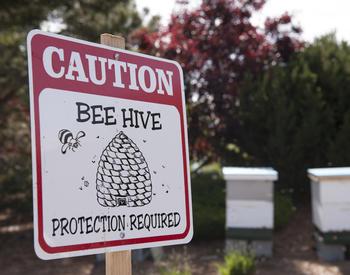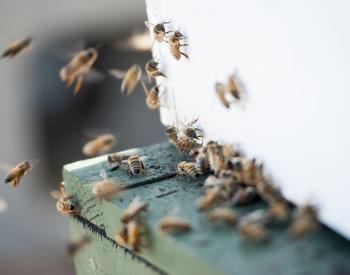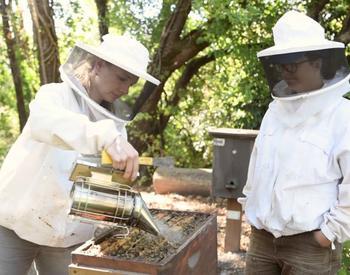Transcript
Speaker 1: From the Oregon State University Extension Service, this is Pollination, a podcast that tells the stories of researchers, land managers, and concerned citizens making bold strides to improve the health of pollinators. I'm your host, Dr. Adoni Melopoulos, assistant professor in pollinator health in the Department of Horticulture. Okay, it's January, so this means one thing for the commercial beekeepers in Oregon, pollinating almonds.
That's right, the nation's almond crop is massive and it requires almost all the bees in the US to pollinate, and that includes our beekeepers from Oregon. So I thought it would be a great time to catch up with one of my favorite beekeepers in Oregon, Harry Vanderpool, who has a beekeeping operation outside of Salem. Harry's been a real mentor to me in terms of how to talk to people in agriculture, and pesticide applicators about bees. He's really skilled at it, and I wanted to share what he's taught me with you in terms of coexistence or to use a phrase that Harry uses commonly, how we can all make a living at the same time. So in this spirit, this episode is dedicated to all the hardworking commercial beekeepers here in Oregon who over the next 10 or so months are going to be busy pollinating a vast array of crops, making sure that we have some excellent crop productivity in the region. Harry, welcome to Pollination.
Speaker 2: Glad to be here. Always nice to talk with you.
Speaker 1: I always tell people that you were one of my key mentors when I first arrived in Oregon, and sort of showed me how to talk to the diverse amount of people that a beekeeper needs to interact with in a state as so many different crops and so many different people. So I really was excited about the prospect of having an episode thinking a little bit about how beekeepers can effectively communicate and talk with growers.
And so we're recording this in December. By the time this airs, you're going to be loading your bees on a truck for California. Tell us a little bit about how you start off communicating with a grower who's expecting your bees to come in.
Speaker 2: Well, it's really a wonderful story that I think about a lot that I had a really good mentor as well. So going back, when I was still working in the industry, I was not a full-time beekeeper.
So that would be in prior to 2005. I woke up one morning with a helicopter spraying Christmas trees behind my house. And it was really super early in the morning, and it was nice and cool.
And I thought, well, I don't know what he's spraying, but it looks like whatever they're doing, they're doing it right. It's nice and cool, and the bees won't be flying for a few hours. And I got my car and I left. I just thought all day long, that's the only one and only neighbor that I had not yet met. And I just thought, you know, I need to get a hold of this guy and just have a talk with him and see how that goes. And so I talked around my neighbors and I got his contact information and turns out that my Christmas tree grower behind me was also an educator.
Speaker 3: He taught pesticide classes, pesticide certification classes,
Speaker 2: in the same room at Shemeckada Community College where we hold our monthly beekeeping meetings. And he was very, very easy to talk with and just loaded with information. And he told me, well, I will call you.
I'll give you, I will call you way ahead and let you know next time I spray my field. So that day finally came. The next time he was going to spray, he called a week ahead. And then I said, OK, well, thank you very much for letting me know because I'm moving bees in and out all the time. So I thought, well, I'll just move them out now.
And if I got to move bees into a yard, it'll be somewhere else. And then he called me a day or two ahead and I said, great, I'm ready, ready for you. And he sprayed his field. And then amazingly, he called me after that afternoon and said, I'd like to come over.
I know you still have a couple of hives that you didn't move out. He says, let's look and see if we can. He wanted to come over and look in front of the two or three hives that I had left on the property and just see if we could identify any.
He had sprayed Lorzban in the field next. But anyway, we struck up a great relationship. And he became my go-to person for learning about working with pesticides around my growers in all of the different crops. He became a very good neighbor and friend. And then one day in 2011, he called me and he was heading up a pesticide recertification class that was going to be held at OSU. And he asked me if I would speak there. And amazingly, he had meshed Segele, to go to Redmond and speak at one of those classes and had me go to OSU and speak at OSU. I thought that was funny.
Speaker 1: Okay, so that's really remarkable. There are two things that I just want to sort of point out. The first one is that many of our listeners may not quite understand Christmas trees and bees. It's a conifer. Why on earth? Just quickly, why are honeybees going to Christmas trees?
Speaker 2: So Christmas trees have a number of pests. One of the reasons they have those pests is because the aphids like to show up and leave a sticky residue on the needles that other insects feed on.
And certainly, honeybees are one of them. And there's actually a talk of Christmas tree honey, which is actually honeydew honey, harvested from that honeydew the aphids leave. But as well, there are a lot of regulatory issues with shipping Christmas trees to other states and other countries. They cannot have the aphids or yellow jackets or anything present in the trees.
The things that they spray on the Christmas trees have often been some very nasty pesticides. But what I'm very thankful for that I learned with that neighbor and with all of the others, because my property ended up being surrounded by Christmas tree operations, is that the solution was working together. And that relationship and the bonds that I built with my neighbors turned out to kind of set me on a mission to help and to see if I can help other people find harmony in dissimilar agricultural sectors because we're really all working hard and trying to make a living at the same time and working together is the answer to that.
Speaker 1: Well, I did want to pick up on this next part. You mentioned that your mentor brought you in front of pesticide applicators in a classroom setting and I've been around the state doing training myself and you've often opened the doors for extension staff because you have a way of talking with applicators that really gets their attention. Well, thank you for that.
I should try my best. So, it seems like your skills were honed in actually talking directly to pesticide applicators. Can you tell us some key tips on when you are talking to pesticide applicators about pollinators, how do you make a connection with them?
Speaker 2: Well, being a commercial beekeeper, I move bees in and out of all sorts of different farming operations. Start out with the almonds, well, that's a tree orchard. You know, go to cherries there again, your tree fruits, but then there are seed crops. You see a lot of different operations going on and you get to know a lot of people in agriculture and you learn to respect and appreciate how hard they work to provide the food they put on the table.
And I guess my number one operational theory is that there needs to be peer-to-peer respect there and respect there's no easy money in agriculture. And they're working just as hard as I am. And banging your fist on the table and pointing your finger is just going to throw walls up. I want to build bridges.
And those bridges can happen suddenly. I guess it's one of the things that I enjoy the most is walking into a group like Christmas tree growers mosquito abatement or aerial pesticide applicators and knowing that there are a lot of people that want to put them out of business. And they find out that there are reasonable voices and ways to move forward and work together.
Speaker 1: And I've often seen you in front of an audience like that thank them for the work that they do.
Speaker 2: Absolutely. I mean, it's mosquitoes. Hey, I lived in Minnesota for a couple of years. I know what mosquitoes are. And we talk about protecting pollinators. That is so important. We have to protect people too. There are a lot of diseases and illnesses from mosquitoes just in addition to being an annoying little critter. We have to also recognize that out in society there are a lot of people who hate bees.
Now I'm saying bees because anything that flies and buzzes and stings is a bee. Right, right, right. So do we want to be like those people and bang our fists and point the finger or do we want to gain some knowledge and see how we can work together so that all of society benefits?
Speaker 1: In that way, you sort of make a connection. You sort of, if you said it earlier in the interview, we're all making a living together. And so just recognizing that you know, to pull off a crop in the state of Oregon, a lot of these crops are going to require really good bee pollination, but they're also going to require making sure that crop stays healthy.
So you make that connection. So imagine for a grower, the inside of a beehive is mysterious. Like how that translates into yield. And can you tell us a little bit about how you help a grower understand why management practices will ultimately, you know, how their kind of pesticide regimen or how they treat the bees is going to help them? What's your strategy there?
Speaker 2: The first thing in it begins with a trust relationship. As soon as they see that you're looking out for them as well as that they're looking out for you, things really smooth out. When I first started moving bees into crops, the idea of even bringing up pesticides, you would, would get a response similar to this. What are you causing trouble already? You know, what? Don't worry about it. Well, you know, we'll take care of the pesticides. You just take care of the bees. Those days are over. And it started on the second edition of the PNW 591.
Speaker 1: How to reduce bee poisoning. We need to snap your title.
Speaker 2: Thank you. And I started presenting that to my growers as a gift. Just give that to them and show them how that I read through it. In the following years, I would call them and, basically, it's like this. Usually, the first and last call you get from your grower isn't hello, I want to visit.
It's Hello, Harry. I need to spray my trees, but I need to get the bees in. So, usually, the first and last call of the year from each grower surrounds pesticides. And now as a wonderful tool and people are finding out nationwide, we're using that, that publication.
Speaker 1: Okay. Let me just, let me just break that down for people. The first call you're going to get is a person growing a crop and they really want to prevent exposure. That's right. They'll try to do a treatment before your bees arrive. And so then they don't have to sort of put an application on during bloom.
Yeah. That's the first call you're going to get is like, I'm doing this, when can the bees, so there is a timing issue of trying to coordinate when to bring the bees in and when to do some pest management.
Speaker 2: A lot of the, a lot of the applications need to be done in bloom, which is a disaster for bees and pollinators. But, but we work around that. And once the bees are in the farm, then on the field, we've been trying to cultivate an attitude of, okay, now how can we optimize or maximize the efficacy of each and every one of those bees in the hive during the time they're in the field? I was just like the growers do when they apply fertilizers. You know, they don't just start dumping fertilizer. They check the pH of the soil to make sure. I mean, you can put fertilizer on a field with the pH way off and it isn't going to help you out at all. You've wasted your money.
You've wasted your money. The same thing with bringing bees in and doing things such as poorly timed pesticide applications, using irrigation systems that impact the hives, running into them with equipment, and putting them in the shade. There's just a lot of difference. Okay.
Speaker 1: What do you say? So there's a lot of things. There's a lot of things. Not just pesticide application. Oh, absolutely. You may have, you've got a real famous, I love it, is a great presentation. You show growers where an irrigation gun pulls the hives, you know, just down and knocks the hives over or you need to get into your beehives to manage them. They don't realize it's not like fertilizer.
Once it's dropped in the soil, it just sits there. You actually have to manage them and you come to work your bees and there's like equipment in the way you can't access.
Speaker 2: Poor location for servicing. Maybe it's muddy. Once they're put in, you can't access them. Putting the bees in the shade where they're going to get out later in the morning. They're better off where they're going to get the morning sun. A lot of different considerations and that's just working together.
Speaker 1: And so all of those things, your strategy is to point out that in the same way as that fertilizer, you're going to optimize it so that it really gets to the plants by location and properly, you know, managed irrigation and pesticides, then those bees will be able to turn a flower into a really high-quality barrier or seed pod or something like that.
Speaker 2: When you open up a honeybee hive and you start pulling frames out of eggs and larvae and brood, those frames are heavy. Your brood frames are heavy and they're heavy with brood.
Where did all that come from? The important thing for both the grower and the beekeeper to know is if you've optimized all of the conditions out in that hive that's around that field that's being pollinated, it takes pounds of nutrition, everyday pounds of nutrition of pollen and nectar coming into the hive to keep that brood going. Conversely, the brood necessity, the requirements to nutritional requirements for that brood is going to result in a very effective pollination of the crop. So it's really a hand-shaking hand when you work together, both the grower and the beekeeper to optimize the conditions for those bees.
And one thing that I've done over the last several years is when I pull bees, especially in the fall where they're really big, I'll pull the bees out of the crop and there's a great big beebeard. It's all over the face of the hive.
Speaker 1: There's a beebeard, a bee hanging out the front of the entrance.
Speaker 2: Yeah, there are as many bees. It looks like there are as many bees on the outside of the hive as they are on the inside. Gotcha. And when I go to pick those bees up, I take a picture of that before I start loading and I get home that night and email it to the grower and say, take a look at this picture here. Thank you for providing that space and doing all the things right we did this year. I brought you strong healthy hives and when they come out looking like this, you darn well know it's because they were busy collecting pollen and nectar in your field. And it's a partnership. Commercial pollination is a partnership when things are done cooperatively.
Speaker 1: Partnership, I guess, and when those colleagues are bearding and they're strong like that, that means also that there's a lot of seeds that are shed in that crop. It couldn't be better. They've got a seedbed. They've got a seedbed.
Speaker 2: It's a lot of fun. I've really enjoyed watching, well, talking to some aerial applicators that I know, the aerial pesticide applicators and they're very adamant about things have really changed in their lifetime and they've seen that cooperation is on the upswing and really always glad to hear that kind of message.
Speaker 1: Well, let's take a quick break. I want to come back afterward and just talk about some of the best practices like what when you have growers and applicators who are really doing a great job, what does that look like? So we'll take a quick break and come back. All right. Okay.
We are back. So I've watched a number of your talks and I've also seen you talk with growers a number of times. And one thing, there's a slide that you often have in your slide deck. It's a view with your truck and your forklift driving into your because a grower has told you they really have to get something on during bloom.
They really have tried everything. Can you talk us through, first of all, how that series of events is triggered and also let the grower know? You have another way of explaining this. This is not just free. This is a lot of work on your part. Yeah.
Speaker 2: Well, so it could be a grower or it could be a neighbor for all of us commercial beekeepers. When you hear the commercial beekeepers that have many hundreds or many thousands of hives for every 30 to 50 hives, you've got to have yards, secluded yards where you split these things up and hold them between crops or during a honey flow. And it just may be that a neighbor needs to spray something.
Speaker 1: You're not pollinating. You may just be in between pollinations. You've got bees there and some the guy gives you calls.
Speaker 2: The guy next door says, I need to spray my field and I see you have bees there. And I thank them up one side and down the other. And this is just the thing is that oftentimes working together means work. And for the beekeeper, you know, I'm going to go out in the evening as it starts to cool down and get a little dark. And I'm going to take, you know, $150,000 worth of truck and forklift and trailer and load up the bees. And I'm going to move them at my expense at my time and get them moved somewhere and hopefully get home in time to eat something and get to bed so I can get up and work all day the next day in the heat with stinging insects. And that is the thing that has to happen. You know, you look at that and you say, well, gosh, that's a lot of work and I'm going to benefit nothing.
Well, you are. You're not going to benefit if your bees get sprayed and die with the growers. Again, the first and last thing we usually talk about is pesticides.
But there are a lot of little things too. Like when I first started pollinating, the cherry growers and some other grower groups still believe that they've got to have those hives directly in the rows of the crop. So if it's blueberries or if it's cherries, apples, pears, and that means when they take their ground driven or ground drawn high-pressure sprayers to put on the fungicides, put on the insect growth regulators, it's going to blast those products directly into the entrance of the hive.
Speaker 1: Well, because these are really high-pressure sprayers. They spray up and they really have a lot of velocity.
Speaker 2: They have a lot of velocity. So what are you doing? You have a hive that has pollen in it. in the frames that the bees have stored and added an enzyme to so that that pollen will begin a fermentation, allowing that pollen to be a viable nutritional aspect of the hive for an extended period of time and what you're applying fungicides to that. So yeah, as of several years ago as our company policy, we added that we do not place our bee hives anywhere where they will be directly impacted by ground urban spirit. So all of the cherry growers, everybody got their notice that number one, you're way better out.
Again, this is the optimization. The hives are better pollinators when they're out in the sun anyway so they can get started earlier in the morning. They don't get a direct application of fungicides and pesticides etc. Tractors and buggies and things aren't as likely to strike the hives in those.
Speaker 1: Especially in some of these orchards, the deer fence is right up against it like you can barely drive a truck. That's true. They're so tight.
Speaker 2: And in that case, I have that case where the bee hives are now on the other side of the fence. They're not only not in the rows but they're on the other side of the fence out in the direct sunlight. I have been successful in getting my cherry growers to place cherry totes upside down that I place my pallets of bees on, get some up a couple of feet off the ground, and eliminate skunk predation which is really bad that time of the year.
Speaker 1: And also probably get colleagues heated up earlier.
Speaker 2: It gets them heated up, gets them up into the air where the moisture is the less of a problem. This is all just working together.
Speaker 1: Well, I suppose there are two things I wanted to sort of pick up on that. The first thing is, and you've often mentioned this, you don't just rent the bee, you rent the beekeeper. That there is a considerable amount of management. Like you just, it's not like, again, it's not like the nitrogen where it just, it has to be actively managed for the bees to be able to actually do the job. If you put them in a cold spot, you don't understand bee biology. You spent $50 on the rental but the rental is not giving you $50 of value.
Speaker 2: It rarely comes up anymore but it does occasionally. We do not rent bees. We don't rent bees. We provide pollination services that are paid for on a per-hive basis. We provide pollination services because renting a hive can give people ideas. Things have happened where a grower, their son, or their brother-in-law says, well, I'm going to go out and I'm going to cover them with this queen. Maybe that'll heat the hive. You don't want to ever let anybody think you're renting hives because we don't do that.
Speaker 1: But back to the original, the idea of working with the grower's work. You had this kind of example where you go in with all this equipment and pull it out.
I know one thing that you've often said is this is give and take. I'm actually coming in. I'm obviously trying to protect my bees so that I have some benefit. But this is something where it does take time and labor out of my day. You'll often have another conversation with them down the road. Incidentally, I did this thing for you and the wash water, you'll say. That's right.
Speaker 2: I like to bring that up we are always willing to do our part. It's really important that the growers and your neighbors know that we're not there to be in the way. We want to do our side of the coin as far as pollinator protection and protecting bees and their crops and industries as well. But to show up at five o'clock in the afternoon with a truck and get back home at one o'clock in the morning because you moved bees as a courtesy for someone else and to protect your bees. Now the next time I pick the phone up and ask some simple little request like, hey, I hear it's going to be 105 degrees for the next few days. I just want to let you know that the bees are going to be forging for water.
So if you could just kind of lookout for what's in your rinse water, your spray equipment, and if you have any old pesticide bottles lying around upside down in a puddle, the bees will be forging water heavily during those periods. Little request. We really ask very little of our neighbors and growers other than just to talk. But on our side, it's quite a bit of physical work really.
Speaker 1: So there is this give and take. It's like you need to be responsive when a grower calls you. It's not answering the calls. This is a really bad thing. But at the same time, when you are responsive, go back to the grower and just remind them of their responsibilities. That's right.
Speaker 2: I'm really impressed with the aerial applicators. I got a call one day from a, I had bees in sunflowers. I just moved them in two days before. And the grower calls me and says, I'm sorry, but we've got, I think it was alive.
There's something, it had something on there. We've got to spray these sunflowers. And I'm like, geez, I got to move bees tonight. Okay, great.
And that means moving them out for a few days and moving them back. Wow, a lot of work. It is.
Bad news. And then I got a call maybe two hours later from the grower going, forget it. I called the aerial applicator and they said those sunflowers and bloom, they aren't going to spray them. And I appreciated that fidelity, you know, to life by the aerial applicators. I had an instance behind me where the Christmas tree grower needed to spray. And by the way, you know, I've gotten to know a bunch of the aerial applicators. And so I say, Hey if you're talking to Terry, you know, the applicator, I said, the blackberries are coming into bloom. I said, could you just ask him to please avoid the blackberries if he can? I mean, I know he's up there doing 90 miles an hour.
Speaker 1: The applicator has been asked to come in and control on Christmas tree, but there's some bloom on the edge and there was a possibility of drift.
Speaker 2: Right. And possibly a drift. And I just, I just said, I said, you know, I know he's got to do this, but if, and then two minutes later, I get the callback, okay, now he's not going to spray. And I talked, I said, put him on the phone and I talked to them, but I just, anyway, we were able to work it out, move some bees, and get it all done. But it was not through an adversarial tone. It was through recognizing, hey, this is my neighbor who needs to spray his trees, you know, and he's called me to protect my bees. And you know, it all, it all works together if you just work at it.
Speaker 1: The last question I have for you is you've been a real advocate of this, how to reduce bee poisoning from pesticides manual. And the one, and I know last beekeepers association meeting, or the one before that you made sure that copies were all the beekeepers had and you showed them how to use this book with a grower over the phone. Can you walk us through how you use this tool to help protect bees?
Speaker 2: I will, but I'm before I before I answer that, I'm happy to report that after a number of years of using this publication, I am now having growers call me and they already have it open in front of them on their desk. And they're calling me with the book open. I'm very, I just excited about the first time that happened.
I couldn't believe my ears. But yes, so the one thing I don't do as a beekeeper is make pesticide recommendations. I don't pick out, I have had them at, well, what do you, I say, no, you know, that's really for you and your crop advisor. And then give me a call and we can talk about it. And then they will call me and usually they're calling me with a trade name. Okay, it's tempo. It's XRL, it's something. So you take PNW 591, and you go all the way to the back of the book where the trade names are in table five.
And then that cross-references you to the middle of the book. Table four, where, where you have the active ingredient and the pollinator impact recommendations and precautions. And it's just if nothing else, because sometimes there's no precautions, sometimes it's just awful. And you know, you're gonna you're sitting there talking. If nothing else, it's a real icebreaker and a conversation piece. I do want to say something while we're talking, if I may. Yeah, of course.
So, my neighbor got me on the circuit of talking to pesticide recertification classes. That's one of the best things that ever happened. The second, even better thing that happened was the Oregon Bee Project. And particularly you, and the efforts that you've put in and all the coordination you're doing, it's a dream come true for me. It really is a dream come true for me. It's taking what my neighbor and I got started and just a quantum leap above that. And I'm very, very grateful and very grateful for that.
Speaker 1: Well, that's thank you so much. And I think there is a kind of way in which Oregon really, you know, when we did think about how we were going to do pollinator protection in the state, we really thought of a building on the strengths and we had a lot of things going in the state or working on it. That publication really is useful and it also is a publication that has been around for a while. And one that we're, you know, continuing to revise. And so I guess the thing is, kind of going through and being able to flag out the one areas, the, you know, the residual toxicity and how long something is going to be toxic.
Right. And then being able to figure out when calling is in place or, you know, so I guess you get the pest control advisor, and the grower would come up and say, okay, this is the best option that is affordable for us for doing like this control or these three products. And, you know, that we're planning to spray one of these
Speaker 2: and then make a decision about moving in the bees or moving them out. There are a lot of components to it, but I think we're on the right track. I'm very, very, very confident that we're on the right track with what we're doing.
Speaker 1: I have one last question for you, actually. So I think for a lot of people, it may be a little bit mysterious about what pesticide recertification involves. Now, I've always been impressed. You will, obviously get called in to give these talks. When you go talk to them, what are they, and I'm very basic, like, why are they there? Why are they coming to hear you talk about pollinators and pesticides?
Speaker 2: Like, what's the so if you look at a lot of other professions and industries, whether you're a doctor, whether you're a pharmacist, there's ongoing education required. And how wonderful that it is to have your pesticide certification that there is an annual set of requirements because things change. Just as soon as we print this PNW 591, it all changes and there are new products on the market, new strategies, and new pests. I mean, it's ongoing and ever unfolding. And as well, the pollinator problems are in the same boat. The problems mound and they snowball, and they certainly aren't getting any easier or better.
Speaker 1: So, No, it's totally true. Like, you know, adjuvants or something that I'm going to be incorporating next round of training. It's like, it's an issue that really in the last year or two sort of emerged. And you know, crop consultants want to know why was that a Will Barales meeting the other day and they're like, what is this stuff with adjuvants? And it's like, you know, being able to, an applicator who's in a changing world, new science, being able to have, you know, better knowledge of what's huge.
Speaker 2: That's huge. Well, the other thing with going out and speaking to the groups is you don't, it's more than just passing on information. I believe it really is. You don't want people who are foresters, farmers, fiber producers. The only thing they ever hear about pollinators is the latest headline. I think that it's really beneficial for them to know that people, reasonable people out there, you can talk with and work with. And it isn't all just a bumper sticker headline. Just the aspect of talking is a benefit in itself.
Speaker 1: I agree. These people, licensed applicators need to get a certain amount of credits every year. So they have to attend these courses. And the one thing that's really great in Oregon is it's a core credit. So pollinators, they're very sought after credits and we can, you can show up in a small county as you often do.
I think you were out in, out in central Oregon just a couple of months ago. And you'll get a full room of pesticide applicators. You're really interested in hearing what you have to say.
Speaker 2: Well, or as it was put to me by my neighbor when he sent me to my first one, they are going to be so bored by the time you get there, they're going to love anything. I said, okay, great. I'll have a lot of trucks and forklifts in the thing. And, I got took first place in grading the feedback forms on my very first one, just because they got something cool and exciting to look at and not just labels.
Speaker 1: You know, I've been putting in my training, like, what do you want to hear more of at the end of the thing? So I use these clickers. And I always think, oh, I say, you want to know more about sort of hot-button issues. Invariably, people always respond, I want to know more about the bees. Good.
Speaker 2: That's good. That's really good to hear. Applicators are just curious, like, what are these things? They want to know basic bee biology. I always think, oh, that's, you know, they're very practical people. But no, actually, they're really interested in the bees.
And I saw that as well. I have incorporated when I'm speaking with grower groups such as cherry growers, blueberry growers, you know, people that you're actually, you know, moving pollen for them, you know, with your pollination services. And gave them that bee biology, I didn't used to do that, but just showed them.
Speaker 1: Oh, well, your latest talk is great. So Harry's latest talk is this kind of like, he starts from like the larva, the egg, and he works outwards. And then he sort of makes the case for
Speaker 2: where did all of this come from?
Speaker 1: It's a great, it's a great, great talk. And the thing I think that's really effective about it, people really like it is because they don't actually know, they know the bees are coming in, but they don't have a real sense of their biology. You do a great job of connecting pesticide exposure to the actual biology of the bees.
Speaker 2: Well, thank you. And you know, I know for a fact that from the older generation, it was, they call the beekeeper, and then they would look out in the field and count how many boxes there are there. And so when you make this point, it's like, it isn't boxes. It isn't boxes, you know, and that it's very fragile livestock. And they only remain, your crop's going to get pollinated well, and the hives are going to do well if we treat them as sensitive livestock work together on that.
Speaker 1: Okay, well, let's take a quick break. I have a set of questions I ask all my guests. I'm going to ask you these. Yeah, you're in trouble now. We're back. So three questions. First question I have is there a book that you really want to recommend to our listeners?
Speaker 2: Yes, there's one by Joe Hansen that I can't find.
Speaker 1: Oh, because I got, I'm borrowing it. That's a good one. No, I think it's the longest. No, I've got it, Harry.
Speaker 2: So there's two cents a day overdue, but fee. I'm just kidding. You keep those long.
Speaker 1: Okay, so it's the, does Joe Hansen and Mayor?
Speaker 2: No, actually, that's not the book. I would recommend PNW 591 and really get a good handle on that. Yeah. Each beekeeper can present that it shows all of the definitions for RT and residual time, extended residual time, and toxicity, it gives a definite. I think every beekeeper ought to know that book as if they can teach it.
Speaker 1: Okay, great. Thanks. You're the first one to recommend that book. I really think it's well done and I'm looking forward. We've been working on the revision now for a year. It's going to be a total redesign. Good. But I think it's been, it really, when it came to bees and pesticides in a practical way, I think it really changed the landscape. There's been a lot of That's right. books that are across the nation.
It's an amazing publication. And I have three of them with me. We've had a boy. Okay, so the next question I have is, do you have a go-to tool for working with honeybees? Is there, is there the Harry man? See, this is really, I can see Harry thinking deeply because Harry is invented, is a very, very kind of a profligate inventor. He invents things. He's inventing something right now. And it's like, but is there something that you're particularly proud of in terms of your inventions that you've sort of come up with over?
Speaker 2: Oh, yes, but it's, I'm proud of my forklift. Your forklift is amazing. 60-mile-an-hour all-terrain four-wheel drive forklift. But I mean, that's kind of silly. I don't think so.
Speaker 1: It's, this is remarkable, this is a really remarkable forklift. It is, I would, I would agree your forklift is because you have, you have an engineering background. Yes.
Speaker 2: So you, you can build these. And I engineered for everybody else. As soon as I left the industry, I built this forklift and said it was going to be perfect and it is. And as soon as I got done with it, I was like, God, what can I build next? And it's just, it was, yeah, it's a lot of fun.
Speaker 1: I've got a picture of it. So I'll put it up on the show notes so people can take a look at it. It's really amazing.
Speaker 2: Yeah, I was like bragging about the forklift. Don't get me started. All right.
Speaker 1: The last question is we often ask people, do you have a favorite pollinator? And with honeybee people, I often say, is it, are honeybees your favorite pollinator? Or the other question is like, is there a specific honeybee colony from your past that you want to remark upon?
Speaker 2: I'm getting really hooked on sweatbees.
Speaker 1: You've got this, we've been talking about this, you've got this big colony of sweat bees outside your place.
Speaker 2: I do. So we're coming up to the home and garden show one year and we're walking down the hallway and there's a sign up that said a talk is going to start, we look at the time, it's going to start in five minutes about pollinators. I'm like, who is this? So I went in with Matthew Shepard.
And he was, yeah, and he's talking about all these native pollinators. And my wife and I are looking at each other going, well, we got, every one of them, come on, we've got that, we've got that, we've got that. And we go home and there's a bank, which I've always thought they were ants, little ant hills all over the side of the bank. And now I've since seen that they're these little sweatbees. I love them, dearly love them. So hard working and yeah. Sometimes they fly and the pollen they're carrying is, looks to be almost bigger than their body.
Speaker 1: That is a funny thing because they've got, they don't have curvicula like honeybees and all these spoons, they've got like Velcro running up and down their leg. And they look like they're like 50% pollen.
Speaker 2: How could they carry all that weight? And they're out early in the morning and yeah, we love them. And sometimes it's just, you look at the ground, if you catch it the right time of the year and it looks like the ground's moving, there's so many of them on that bank. It's really impressive.
Speaker 1: Well, fantastic. Thanks for taking the time to talk with us and good luck with your almond pollination and all the rest of pollination you have coming up this year.
Speaker 2: Thank you for all you do. I'd only appreciate it.
Speaker 1: Thanks so much for listening. Show notes with information discussed in each episode can be found at pollinationpodcast.oregonstate.edu. We'd also love to hear from you and there are several ways to connect. For one, you can visit our website to post an episode-specific comment, suggest a future guest or topic, or ask a question that can be featured in a future episode. You can also email us at [email protected]. Finally, you can tweet questions or comments or join our Facebook or Instagram communities. Just look us up at OSU Pollinator Health. If you like the show, consider letting iTunes know by leaving us a review or rating.
It makes us more visible, which helps others discover pollination. See you next week.
Harry Vanderpool has been a beekeeper for 25 years in the south hills of Salem, Oregon. Vanderpool Farms is now a family operation providing pollination services and farm direct honey. Harry has served as Vice President and President of the Willamette Valley Beekeepers Association and Vice President and President of the Oregon State Beekeepers Association, and enjoys working with stakeholders and sometimes conflicting agricultural sectors in a balanced manner to find solutions that will offer meaningful pollinator protection strategies.
Listen in to learn Harry’s effective communication methods, how he builds bridges with others in agriculture, and what he’s done for pollinators in the PNW.
You can Subscribe and Listen to PolliNation on Apple Podcasts.
And be sure to leave us a Rating and Review!
“We’re really all working hard and trying to make a living at the same time, and working together is the answer to that.” – Harry Vanderpool
Show Notes:
- How Harry learned to communicate with growers who use pesticides with his bees
- ‘Christmas tree honey’ and why it attracts honeybees
- The key for Harry in developing good relationships with pesticide applicators
- How to help crop producers understand the role bees play and how it will help them
- How Harry further develops the partnership between his bees and the growers
- Why it’s important that ‘pollination services’ are provided instead of renting the hives
- The way Harry helps others use resources to prevent bee poisoning with pesticides
- What resources Harry has provided to crop consultants, growers, and beekeepers in the Pacific Northwest, and how it has affected pollinator health
“There’s no easy money in agriculture, and banging your fist on the table and pointing your finger will put walls up. I want to build bridges.” – Harry Vanderpool
